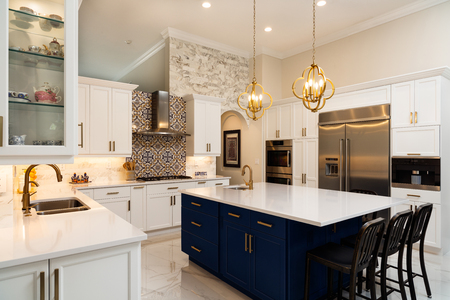
Tile has been used in homes since as early as the 8th century. From wall mosaics to decorative floors, tile is forever loved for its delicate beauty, incredible durability, and easy-to-maintain properties. That being said, while many households incorporate tile into their design, few truly understand its characteristics. In today’s part of our series, we are going to take a closer look at tile’s attributes and why homeowners select this flooring. Let’s take a look!
Ceramic vs. Porcelain
There are two types of tiles: Ceramic and Porcelain. While similar, these two types also differ from one another. Here are their key differences:
Porcelain
The key difference between ceramic and porcelain tile is that porcelain can be used outdoors. Due to its frost-resistant properties, it can be placed in environments that drop to the negatives. Additionally, porcelain has a low water absorption rate, making it the better choice for showers and pools. Lastly, porcelain is considered more durable and harder than ceramic tile, making it a great choice for households that are prone to drops and spills.
Ceramic
On the other hand, ceramic tile is less expensive than porcelain tile. This is due to the way porcelain tile is manufactured. If you are looking for an affordable tile option, ceramic tile may be your way to go.
Durability
Tile floors are typically considered durable due to the way they are made. While being exposed to extremely high temperatures during creation, tile is incredibly tough and often difficult to crack; therefore, homeowners love the durability and reliability of their tile floors.
Hypoallergenic & Sustainable
Many homeowners choose tile because of its hypoallergenic properties. In fact, parents of children with asthma or allergies love tile floors because they cannot hold common household allergens. Because tile is an impervious surface, homeowners can rest at ease that their household floors will be free of bacteria, fungi, mold, and other dust mites.
Curated from natural and sustainable materials, tile is the most environmental-friendly flooring choice on the market. In fact, it can help moderate the temperature throughout your home and create a more energy-efficient space.
Water-, Slip-, and Fire-Resistant
While many homeowners are probably aware of the fact that tile floors are water-resistant, since they are frequently used in bathrooms, many homeowners may not know that tile floors are fire-resistant. In fact, its fire-resistant property can help homeowners feel at ease with their flooring decision. Since tile is a non-flammable material, if a fire were to happen, it will not produce smoke or burn toxic fumes, helping to give you peace of mind.
In addition to being fire-resistant, tile floors can have slip-resistant properties to keep your family safe. Some tile designs offer a slip-resistant barrier through their different textures and finishes, which works well in pool areas to help avoid any accidental falls.
All in all, tile is a very diverse and beautiful flooring choice. From pools to backsplashes to floors, tile can add a touch of elegance to any home design. For more information on ICC Home’s tile selection, please visit us here.
Additionally, if you missed the previous posts in our series, be sure to visit their corresponding links here: Carpet and Hardwood. Also, be sure to check back next week for our final part of the series on Luxury Vinyl Planking.
Honestly, tiles for the win! But I think the fire resistant element should be more well-known, too. Apart from that most people chose this because it’s neat and nice and fresh all the way. Easy to clean too. Thanks for this!